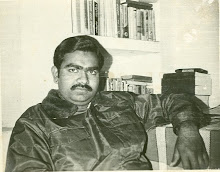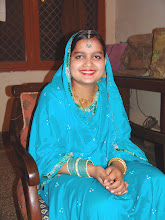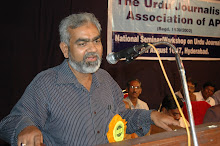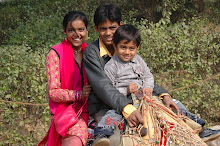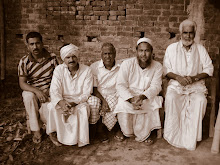SHRIEKING CRIES OF WOMEN
Anjum Naim
Amidst the cacophony of the Parampura area within the commercial city of Kanpur, is situated a small mofussil locality called the Juhi Mohalla lined with half-pucca houses. At the end of this row of houses, lies a temple dating back to ancient times. Just adjacent to this temple is a plot of land fenced by mud walls of over 3 - 4 feet height and owned by one called Ashok Dubey. There are 8 - 10 dingy little houses within the premises of the plot, which are inhabited by tenants. Towards the west of this array of dwellings, the remaining portion of land is occupied by a few beasts of burden tied to poles. Looking towards the right side, one conspicuously notices a dwelling with a thatched roof having no doors. Here lives 17-18 year old Tarana along with her five sisters, a younger brother, a father who pulls rickshaws during the day to take care of the family and a frail mother who does household chores for other people. This is how she still lives. Living may be too exaggerative a word; she barely manages to survive, to exist. A crowd had gathered around us as we stood there. However then it so happened that an entity came and stood before us, someone whose face was radiating beauty and whose large penetrating eyes had no inkling of astonishment or bewilderment. Perhaps the crystal clear face, which seemed to tell a million words, had become tired of relating its story again and again. And then, as Tarana’s sister pulled away the dirty-white dupatta tightly wound Tarana, from her body; it was all the more difficult to concentrate on what was unfolding before us. It was like a large canvas before us on which there was the full sized figure of tall-looking nude young girl sketched in water colours. Both her arms had already been severed up to her shoulders, from her frail body. Instead of rising round breasts - the symbol of womanhood, the area was covered with two large round black-coloured marks. The flesh from her waist up to her private parts had sagged and hung loose. Her toes had been disfigured badly and they stuck together in an unshapely manner. By all means, it was an unseemly sight. However, the face had been deliberately left untouched and was absolutely clear of any mark. The two large eyes looked blankly from the face, as if wanting to tell a story deep within.
On our insistence, Tabassum started tying a dupatta around Tarana’s lifeless, limp and log-like figure. ‘Why hadn’t any drop of acid percolated down to her heart? Is it what they call living?’, muttered Tabassum and broke into uncontrollable sobs as she covered a dupatta around her sister’s limp, vegetable figure. Then, when I gathered myself and recalled the questions I had prepared myself to ask her, I put my first question, which was more routinely in nature. ‘After all, how did it all happen?’ ‘It was fortunate enough that I survived after getting burnt in the pitiless acid.’ These were the first words, which Tarana spoke. The tone had a distinct mixture of hopelessness, frustration and anger. I soon noticed that the clear and dry eyes were getting filled with water. Subhashini Chaturvedi, a social worker from the Sakhi Kendra, a welfare organization working hundreds of victimized women and girls like Tarana and her sister Tabassum, gave us explicit details about the hair-raising incident. Beyond a few factual differences, which we later confirmed from the neighbours, everything was as much true. Here goes the painful saga……
On this plot of Ashok Dubey, like many others, Tarana’s mother Shaakira was also a tenant. Some other tenants wanted to forcibly occupy Shaakira’s house, about which she complained to Ashok Dubey. Acting upon the complaint, Dubey immediately sent those tenants a notice to vacate the premises, although the deadline was extended a little bit on their request. Barely had a week passed since then, when Tarana was abducted suddenly. She was taken away in a jeep by her neighbour Najo along with three other male relatives to another relative’s place. Tarana says that Najo gave her something to eat; thereafter she does not remember a thing. She adds that when she gained consciousness after some time, she found her shalwar to be soaked in blood and that she was being administered electric shocks. She became unconscious again. All limits of barbarism were crossed in that dingy little room. Shaakira on the other hand, had left no stone unturned to look for Tarana, but it was all in vain. On the fourth day as she stood cursing her fate in the verandah, a car stopped in front of her house all of a sudden; somebody tossed Tarana out of the car and it sped away. Her entire body was relating a telling story. Leaving the face apart, there was hardly any sensitive part of the body, which was left unburnt by a strong acid. At the hospital, in a last-ditch effort to save her life, they had to amputate both the arms first and subsequently the shoulders as well. Even the bones had got burnt. Months after the tragedy that had befallen on Tarana, she has managed to survive, but she isn’t more than a living corpse, merely throbbing to exist and fighting to add seconds to her frail existence. Her completely burnt chest has a heart which beats at its own pace and her broad clear eyes are still reminiscent of a tragedy that lay in her fate.
Somehow, I managed to come out of Ashok Dubey’s plot after having met Tarana, but it seemed that my legs were paralysed. I was inching my way forward and a small group of local people was accompanying me. At that instant, the priest Pt. Devi Prasad Tiwari of the ancient temple descended fast from the stairs and approached me. ‘Have you seen how cruel and oppressive the man in kalyug (modern times) is? Move out from this bustee (locality) quickly or you will find it difficult to move even two steps soon’, he reprimanded. The sun was shining mercilessly. I got into my car and ordered the driver, ’Shelter home- Sakhi Kendra’.
In the late 70’s, a number of workers were killed in a police firing during a strike at the Swadeshi cotton mills in Kanpur. The shelter home of Sakhi Kendra was established for the welfare of their widows. At present, it is a shelter or refuge for hundreds of girls and women in the state who have been faced the darker side of life. Hundreds and thousands of women here are fighting against the discrimination on the basis of gender within the city of Kanpur and other adjoining 120 bustees. A few days back, the American embassy donated close to 10 lakh rupees for the project ‘Furthering women rights in U.P’ under the aegis of the Sakhi Kendra, from the Alumni Grants Programme. As a result, the organization has established centers beyond Kanpur, in Lucknow and Jhansi as well. According to the president of Sakhi Kendra, Neelam Chaturvedi, ’if something is done with sincerity and commitment, funds are not a problem. You have to let your work, your performance do the talking and people would be of course, attracted to you on their own with whatever they can offer.’ Talking about Tarana’s case, she said that Tarana spent around three months at the hospital. The expenditure totaled up to several lakhs. However, there was no problem as far as the funds were concerned for her treatment and even bringing the culprits to book. At present, there are more than two dozen women and girls who have been through tougher times in life, struggling to overcome the baggage of the past and taking on a new innings in life. In addition to it, they are now working as counselors for others as well. Neelam says, ’who can have a better experience and feeling of what happened with the victimized women who come here than those living here? That is why the girls staying here at the shelter are devoting each minute of their life for enriching the their life and that of others.’
As I was engrossed in discussing Tarana’s issue with Neelam Chaturvedi, I had a side glance of Archana, the counselor at the Kendra sitting nearby. I could easily notice the tears in her eyes as well as a strong sense of anger and sadness on her face. Not more than a few minutes later, she could barely control herself anymore and broke into loud sobs. Women gave birth to men to create heirs on this planet. Men on other hand instead of being grateful to them and showering them with love and respect, did not miss the slightest opportunity in denigrating them and commoditising them in the markets. Incidents of rapes, molestation and acid attacks are on an ever-increasing trend. You are still wondering and sympathising with Tarana, in fact more than a dozen incidents of acid attacks on girls have been reported, targeting their faces and sensitive areas of their body, in the city of Kanpur alone in the past one year. Every following incident is more dastardly and beastly than the previous one. Everyone from Gudiya to Zahida to Megha, Mridula, Sapna or Soni has her own story to tell, and one keeps on wondering at the magnitude of the crime and the human barbarism. Their saga touches the chord of the heart and leaves one’s eyes dry. After all tears also have their capacity!
There is a large hall on the second floor of the shelter home. Here, girls learn to read and write or perform rehearsals for street plays during the day; at night they sleep in this hall. On one bed, a girl is sitting with a book in her hand trying to memorise something. She was about 20 -22 year old having a whitish complexion with long flowing hair but a little disorderly. However, the face was absolutely blank and the eyes just like Tarana, seemed to tell another sordid tale. Looking at us, she tried to gather herself a little bit more. ‘This is Gudiya’. Neelam Chaturvedi who had brought me to meet those living in the shelter home premises, introduced her to me as she lovingly ran her fingers through Gudiya’s hair. ‘She is a very good girl. This year she has passed her intermediate examination.’ Gudiya sat there with her head hung and lost in her own little world, which she had perhaps built brick by brick. Apparently, she wanted to say, ‘please tell something more about myself’. After passing the eighth standard, Gudiya quit her studies on the insistence of her mother and began assisting her mother in household chores. An aunt along with her young son migrated from some other city and started living in her neighborhood, for the last few days. There was a fairly good interaction between them and Gudiya’s family. One day, the aunt requested Gudiya’s mother to allow Gudiya to accompany her to the marketplace on the pretext of some shopping. Gudiya recollects having eaten something at one of the shops in the market along with the aunt and her son.’ But then how and when did I land up in a strange unknown city miles away from Kanpur, is totally a mystery till today. When I started weeping and throwing my arms, I was told that I would be made to marry her son and therefore I had to spend the rest of my life with him. I don’t know whether I was married to him or not, but I can recollect fairly well that I was prepared each night to sleep with a stranger’, she says in an aggrieved voice. Barely crossing the threshold of 16, Gudiya despite taking all possible precautions, became pregnant and then stepped into motherhood. A few days later, the newborn baby succumbed to death. ‘whether it was killed or it died on its own, I can hardly remember.’ After the death of the baby, Gudiya says she decided to escape from that hell. Instead of going to her parent’s house, she went to the house of one of her father’s friend, whom she called ‘uncle’. The uncle showed great hospitality and allowed her to stay in the house. Her father somehow came to know that his friend was sheltering his daughter; however he did not have the courage to bring her back to his home because of the embarrassment he believed, he would have to face owing to her prolonged absence. Soon after, the uncle also got emboldened and things became worse. Gudiya had no more faith in any relation whatsoever. She had lost the credibility of human relations. Her attempt to commit suicide was unsuccessful. Whether she went to the Sakhi Kendra all by herself or was she taken there by somebody, Gudiya does not mention it clearly enough; although Neelam Chaturvedi later told us that her mother herself brought her here. We got up to go and listen to another girl, a frail feeble-looking 17 year old girl by the name Renu. Thereafter, we listened to another girl, Zahida who told us her sordid tale of how his father got her married thrice in his unquenchable thirst for money and more money. It seemed as if there were many large-scale screens placed in the hall and each screen was showing pictures of torture, agony and pain – none of them less in magnitude to each other. Someone had a rendezvous with domestic violence and harassment and somebody had been molested or raped and left to die on the streets. There were also instances of women being used as commodities and sold or bought in open markets. There was absolute uniformity however. There was no discrimination on the basis of age, religion or caste and creed. All of them had been victimized and humiliated! It is in fact a bazaar run by pimps, perverts and savages who have their business in exploiting women, playing with their modesty and subordinating them. Money, personal whims and fancies and individual gains are the only guiding factors here which make everything chalta hai (okay). According to the National Crime Records Bureau (NCRB), over fifteen thousand cases of heinous crimes against women are registered every year in the country. However, this figure is not at all close to reality given the fact that over 60 – 70 per cent cases of flesh trade and sexual exploitation of women are not even reported anywhere.
Zahida brought a cup of tea for me and then spread a local newspaper in front of me, with page three being highlighted clearly. There were two coloured pictures on it in which some were shown holding their children. Alongside, was a detailed report related to the picture. The bold headline stood out conspicuously. The police had raided the city hotel in Allahabad and arrested over two dozen women involved in the flesh trade. A number of women from Madhya Pradesh were duped on the pretext of getting jobs and were later found at flesh centers and red light areas. Zahida looked at me with cold eyes as if telling me in a matter-of-fact manner that it was not the first time that such a thing as happened. God knows how many helpless and troubled women are being taken from one corner of the country to the other and brutally forced into human trafficking. They have just one purpose to serve- sell their bodies and their honour as well.
No country in the world today finds itself aloof from this gory profession. According to an analysis of the US department of labour, no less than 50 thousand women and children are involved in flesh trafficking every year in America alone. Some of them are made to work in hotels and restaurants, some are involved in household chores while the biggest chunk amongst them are forced into or compelled by circumstances to take up flesh trade. Once into this business, they are not only subjected to mental agony, physical exploitation and sexual harassment, some of them are also rewarded with the deadly disease AIDS, thus pushing them into the jaws of death. AIDS has a long list of its victims which keeps on growing each day. The American ambassador to India, David Mulford says that America has spent close to four hundred million dollars in countering the menace of flesh trade and human trafficking in America in the last few years. The United States has also issued a grant of around 90 lakh rupees for twenty four different projects in India during this period. The government of India has also taken certain key steps in this direction, primarily by starting off a programme by the name, ‘Plan of action to combat trafficking and commercial and sexual exploitation of women and children’ under the aegis of the Department of women and child development in 1998. It has worked along with several non-governmental organizations (NGOs) and has shown better results in the states of Maharashtra, Andhra Pradesh, Tamil Nadu and Delhi. However, Neelam Chaturvedi feels that such efforts cannot be successful completely unless even the common man in our society raises his voice and takes action against the menace. She had been to the US in 1999 under the International Visitor’s Programme of the American embassy. In the US, she had met a large number of organizations and shelter homes working for the welfare and assistance of women. Sharing her experiences from the visit, she admits having seen and met many common people taking out a few days or a few weeks every year from their busy schedules and involving themselves devotedly in welfare tasks. The temporary and semi-permanent workers of any welfare organization were found to be working as dedicatedly and sincerely as any of the permanent members of the organization. Neelam adds that,’ I strongly feel that no government or non-government effort can produce the desired results without the involvement of each one of us. Each one amongst us has to take cudgels against the wrong doings in our society.’ Each word Neelam spoke, was true to the core. The confidence behind the words could be distinctly noticed.
As I was tying up my belongings for returning back to my place, the picture of an innocent-looking frail girl, Sapna kept on flashing in my mind and playing with my thought process, the girl who had been forced to embrace motherhood at the tender age of 14. She was a little girl herself, carrying a little baby in her arms. I asked her in an impromptu manner,’ Is it your brother?’ ‘You can call it my brother, my sister or my son. If he manages to survive, I would have to be a mother to it.’ Sapna replied in a casual manner referring to something so serious, bewildering and painful. The hidden message could be grasped easily. Tears rolled down her bony face as she broke into uncontrollable sobs. As I lifted my belongings to leave and moved on, I could still hear her punctuated sobs slice through the abominable lull all around…..
Monday, January 5, 2009
Subscribe to:
Comments (Atom)




